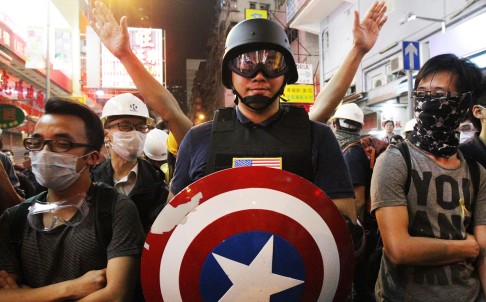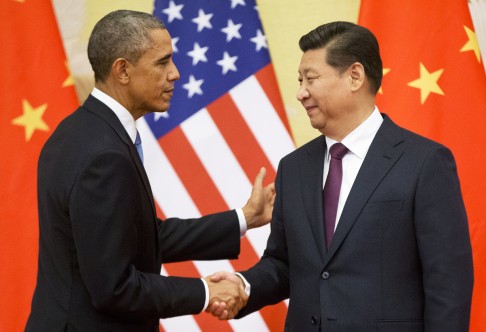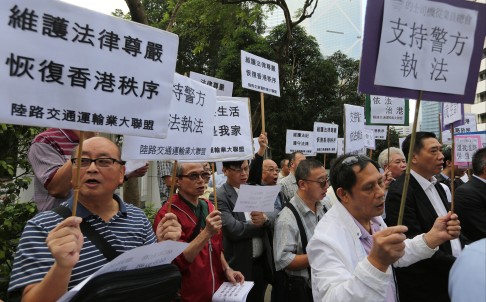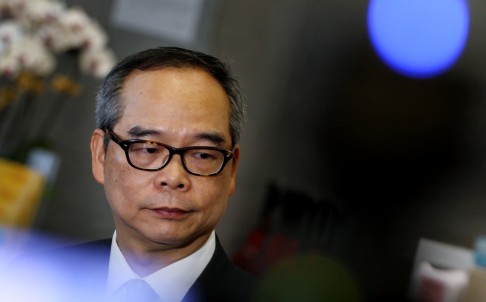Occupy Central
Occupy Central is a civil disobedience movement which began in Hong Kong on September 28, 2014. It calls on thousands of protesters to block roads and paralyse Hong Kong's financial district if the Beijing and Hong Kong governments do not agree to implement universal suffrage for the chief executive election in 2017 and the Legislative Council elections in 2020 according to "international standards." The movement was initiated by Benny Tai Yiu-ting (戴耀廷), an associate professor of law at the University of Hong Kong, in January 2013.
OCCUPY CENTRAL - DAY 46: Full coverage of the day’s events
Occupy Central leaders prepare to surrender as police make plans to clear sites
PUBLISHED : Wednesday, 12 November, 2014, 4:48am
Occupy Central co-founders (from left) Reverend Chu Yiu-ming, Professor Benny Tai, Chan Kin-man. Photo: EPA
Occupy Central co-founders tentatively plan to turn themselves in to police next week, the South China Morning Post has learned.
This comes as police sources say the force may begin executing from tomorrow the injunctions taken out against the Mong Kok and Admiralty sit-ins.
A core member of Occupy Central told the Post that the three organisers of the civil disobedience movement and its volunteers were planning to surrender to police on Friday next week, in an attempt to show that they were willing to accept the legal consequences of joining the "unlawful" pro-democracy protest.
"We will sit peacefully on the roads and let the police arrest us if the clearance starts earlier than Friday next week," the source said.
"We don't want to surrender before Monday - when the Hong Kong-Shanghai stocks 'through train' officially kicks off - as the last thing we want to do is to give [Chief Executive] Leung Chun-ying a chance to show Beijing that he can 'resume social order' as he promised [President] Xi Jinping ."
However, the deputy leader of the Federation of Students, Lester Shum, had some reservations. "The police are already planning to clear the sites," he said. "I would rather be arrested than surrender."
Acting Chief Executive Carrie Lam Cheng Yuet-ngor yesterday urged the protesters to leave the occupied sites as soon as possible, as police had already started preparations to execute the court orders.
"To uphold the rule of law, police are preparing to enforce the law, including making arrests," she said yesterday. "An injunction is a solemn order made by the court, which should be fully respected and strictly followed by all."
The three injunctions cover sections of Nathan Road, Mong Kok, and the space around Citic Tower in Admiralty, opposite government headquarters.
Under the court orders, protesters face arrest if they prevent bailiffs removing barricades.
Detectives from the elite organised crime and triad bureau, led by senior superintendent Brian Lowcock, had held day-long talks with the Department of Justice to discuss legal issues surrounding the implementation of the injunctions, according to a police source.
An application from two subsidiaries of private transport operator Kwung Chung Bus for further injunctions to eject protesters from the main Admiralty protest site on Harcourt Road was held up at the High Court yesterday. Mr Justice Thomas Au Hing-ching adjourned the case to next week so more evidence could be gathered.
The companies had argued that the blockading of parts of Connaught Road Central and Harcourt Road had hit their business, including school bus services.
Barrister Warren Chan SC, representing the bus companies, read letters from parents detailing how pupils had to wake up at 4.30am to catch school buses.
"The world has turned upside down" since the protest campaign began, Chan said, and parents and pupils were exhausted and suffering in "hell".
This article appeared in the South China Morning Post print edition as Protest leaders to surrender ... but not until next week
US has no involvement in fostering Occupy protest, Obama tells Xi
Despite his 'unequivocal' denial of American role in Occupy sit-ins, president gets warning from host to stay out of Hong Kong affairs
PUBLISHED : Wednesday, 12 November, 2014, 1:32pm
America has "no involvement"
The United States has no role in pro-democracy protests in Hong Kong, President Barack Obama said in Beijing yesterday.
But that wasn't enough to avoid a stern warning from President Xi Jinping that the city's affairs were strictly China's business.
"On the issue of Hong Kong, I was unequivocal in saying to President Xi that the United States has no involvement in fostering the protest that took place there," Obama said of talks with his Chinese counterpart.
It is the first time the US president has spoken in public about accusations made by some mainland media and Chief Executive Leung Chun-ying.
"We are going to consistently speak out on the right of people to express themselves and encourage that the elections that take place in Hong Kong are transparent and fair and reflective of the opinions of people there," added Obama, who travelled to Beijing for the Asia-Pacific Economic Cooperation leaders' summit.
Leung has previously said he had proof foreign forces had long been meddling in local politics. In Beijing yesterday, Leung maintained foreign forces were interfering in the city's affairs.
Xi reiterated Beijing would give its full backing to the Hong Kong authorities in handling the Occupy Central protests.
"Hong Kong affairs are exclusively China's internal affair and foreign countries should not interfere in those affairs in any form or fashion," he said, adding that law and order in Hong Kong had to be maintained.
Leung said: "Hong Kong, as a Chinese city and a highly open city, there have always been foreign forces [operating]. And it is my responsibility to have an understanding and awareness of foreign forces involved in movements or activities in Hong Kong."
He did not substantiate his claims but again said he would do so at an appropriate time.
The comments came on the 45th day of the city's unfolding civil disobedience movement, in which thousands of protesters, mainly students, have blocked parts of Mong Kok, Causeway Bay and Admiralty to press their demand for greater democracy than allowed by a ruling of the National People's Congress.
Neither Obama nor Xi mentioned the prime cause of the movement - Beijing's insistence on a tightly controlled nominating committee to vet candidates for chief executive.
Veteran journalist Ching Cheong said the frank exchanges showed the maturity of the Sino-US relationship but would not have any impact on the Occupy movement.
"The only thing I can think of is how it would make people who think there has been external influence behind the Occupy movement embarrassed," he said, referring to Leung and his cabinet.
Meanwhile, Leung said he met National People's Congress chairman Zhang Dejiang yesterday and Zhang had reiterated the central government's "resolute support" for implementing the "one country, two systems" formula and pressing ahead with the city's democratic development.
This article appeared in the South China Morning Post print edition as It's nothing to do with U.S., Obama tells Xi
Adolfo's Umbrellas - a sketch diary of the Occupy movement

Drawings by SCMP’s Adolfo Arranz during the first month of the Umbrella Movement in Hong Kong
Democracy can’t exist without respect for the rule of law
Ronny Tong says that without respect, the entire philosophy of the rule of law cannot flourish
PUBLISHED : Wednesday, 12 November, 2014, 4:57pm
Anti-Occupy Central groups protest outside the High Court as injunctions against Admiralty and Mong Kok occupiers were extended on Monday. Photo: Sam Tsang
Ask any lawyer to give a view on any topic and he will give you 10. Ask a good lawyer and he will probably give you 20. So the Occupy organisers today seem to be courting trouble by asking no less than five lawyers to give their views on something as nebulous as civil disobedience.
I said nebulous because if you care to look it up on the internet, you will find no definitive definition of civil disobedience.
In fact you will find there are as many views as there are different aspects of civil disobedience; from passive protest to active resistance; from pleading guilty to contesting guilt in a court of law; from protesting a law, to protesting a government policy, to protesting a government administration; even from something as fundamental as the use, or non-use of violence.
The difference of views appears to be infinite. But there is general consensus that at least one common factor can be found, and that is, a willingness to respect and accept the relevant legal system. That is the marked difference between civil disobedience and open revolt or armed revolution.
Note I said respect for the legal system, not a particular law. For although civil disobedience started out as a form of protest against a particular law, its proponents never advocate any form of escape from lawful punishment. A willingness to accept lawful punishment is the very essence of civil disobedience.
That in itself is a form of respect to the rule of law. Respect for the legal system is not so much as part of the content of the rule of law as the very foundation of it. For without respect, the entire philosophy of the rule of law cannot flourish.
This is quite different from respect for a particular law. Breaching a law is not necessarily an affront to the rule of law, although persistent and widespread disregard of a particular law can lead to an affront to the rule of law.
This is because no society in this world can boast of a crime-free environment. Every day, everywhere, at any time, there are people breaking the law; but that does not mean rule of law does not exist.
On the other hand, if you start disobeying a court’s decision, you are moving very close to challenging the legal system. You can disagree with a court decision; you may even openly criticise it; but you must comply with a court decision.
In doing so, you are not just complying with the wishes of a judge, but respecting the very office the judge is holding, which is an intricate part of the legal machinery. That legal machinery is what the rule of law all about. Without that, rule of law cannot subsist.
Some prominent public figures, themselves well known lawyers and advocates of civil disobedience argue that so long as participants ultimately turn themselves in and accept legal punishment, that is enough and the rule of law will not be harmed.
Such rhetoric suggests the speaker has confused or misunderstood the important difference between breaching a law and disobeying a court’s decision, which represents the very essence of the rule of law.
Before I leave this topic, I must also say a few words about persistent disobedience of a law and a court order. There is no doubt that widespread and persistent disobedience of the law is an affront to the rule of law. More so as regards a court order.
Someone said to me the other day that I should be happy that 75 per cent of people polled in Hong Kong said a court order must be obeyed. I cringed with fear and sadness. 75 per cent? What about the other 25 per cent? Can you imagine how many people that percentage will translate into? Two million!
I shudder to think what will happen to the rule of law if there are two hundred people defying a court order, let alone two million. I hope and pray the poll is wrong!
Recent events show not only we are not at all familiar with the very essence of democracy, which we never have been; but sadly, we are also not at all familiar with the very concept of the rule of law, which we all boast to be our core value and the fabric of this society we call home.
We must do more. Democracy cannot exist on its own; it goes hand in hand with the rule of law. We cannot, and must not, forsake one for the other. For democracy without the rule of law is but a political tyrant with a better name!
Ronny Tong Ka-wah is a barrister and Civic Party legislator
Hong Kong government unable to explain point of forthcoming report on public mood
PUBLISHED : Wednesday, 12 November, 2014, 5:57pm
Lau Kong-wah said the government was gathering views from protesters and "other people". Photo: Felix Wong
A report being compiled by the Hong Kong government to reflect recent public opinion about the city’s democratic development will form no part of the official reform process, one of the officials drafting the document said today.
The report will include the results of opinion polls and “signature collection campaigns”, likely referring to the controversial signature campaign run by a group opposed to the seven-week-long blockade of main roads by pro-democracy protesters.
It will “objectively and truthfully” reflect public opinion since August 31, when Beijing ruled out an open election of the next chief executive, said Acting Secretary for Constitutional and Mainland Affairs Lau Kong-wah.
The report will be filed to the central government’s Hong Kong and Macau Affairs Office. But Lau refused to explain how the government was collecting views from pro-democracy protesters, and said the report will not form part of the official reform process.
The official process will continue with the public being invited to weigh in on a draft reform package that complies with the tight restrictions that Beijing set out on August 31.
A report based on a first round of public consultation earlier this year was heavily criticised for ignoring or downplaying non-establishment views.
Asked by a lawmaker what the point of the new report would be, Lau could not explain, and offered no thoughts on whether it would help to solve the current deadlock between the government and pro-democracy protesters.
Lau was also unable to provide even a rough date for when the report would be finished.
“We will endeavour to include the different aspirations and opinions from different sectors of the community that have been publicly expressed through various channels, including relevant opinion polls and signature campaigns conducted by different organisations,” Lau told lawmakers today.
“Our consulting objects are not only the mass of students [referring to the street protests] but other people as well,” said Lau
Lau did not specify what the point of the report would be, or whether he thought it would help to solve the current deadlock between the government and pro-democracy protesters.
Chief Secretary Carrie Lam Cheng Yuet-ngor first offered to send the report during televised talks with student leaders last month.
The students plan to visit Beijing in a bid to discuss Hong Kong’s democratic development with central government officials.
A campaign run by an anti-Occupy Central group, the Alliance for Peace and Democracy, claimed to have amassed 1.8 million signatures in support of police and against the street blockades.
The credibility of the campaign was questioned after organisers admitted they had no system to prevent false or multiple signatures.





沒有留言:
張貼留言